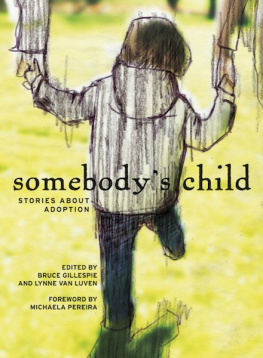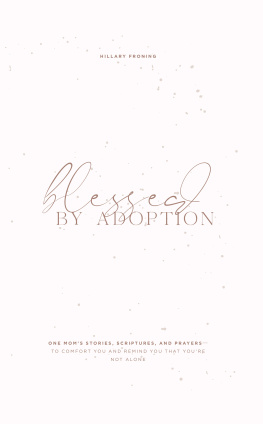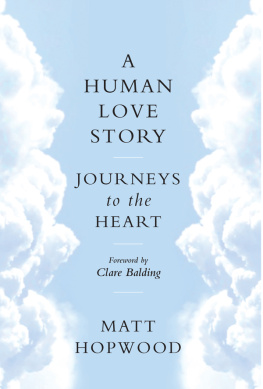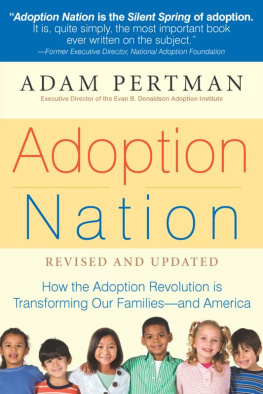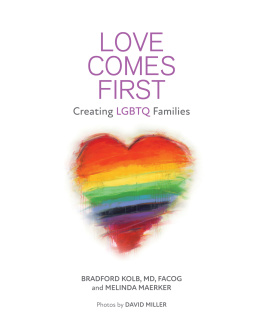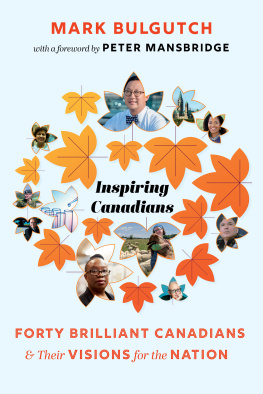Labours of Love
Labours of Love
Canadians Talk About Adoption
Deborah A. Brennan

Copyright Deborah A. Brennan, 2008
All rights reserved. No part of this publication may be reproduced, stored in a retrieval system, or transmitted in any form or by any means, electronic, mechanical, photocopying, recording, or otherwise (except for brief passages for purposes of review) without the prior permission of Dundurn Press. Permission to photocopy should be requested from Access Copyright.
Copy-editor: Andrea Waters
Designer: Jennifer Scott
Printer: Marquis
Library and Archives Canada Cataloguing in Publication
Brennan, Deborah A.
Labours of love : Canadians talk about adoption / by Deborah A. Brennan.
ISBN 978-1-55002-845-4
1. Adoption--Canada. 2. Adoptive parents--Canada. 3. Parenting--Canada. I. Title.
HV875.7.C3B74 2008 362.7340971 C2008-904875-X
1 2 3 4 5 12 11 10 09 08

We acknowledge the support of the Canada Council for the Arts and the Ontario Arts Council for our publishing program. We also acknowledge the financial support of the Government of Canada through the Book Publishing Industry Development Program and The Association for the Export of Canadian Books, and the Government of Ontario through the Ontario Book Publishers Tax Credit program and the Ontario Media Development Corporation.
Care has been taken to trace the ownership of copyright material used in this book. The author and the publisher welcome any information enabling them to rectify any references or credits in subsequent editions.
J. Kirk Howard, President
Printed and bound in Canada
www.dundurn.com
Dundurn Press
3 Church Street, Suite 500
Toronto, Ontario, Canada
M5E 1M2
Gazelle Book Services Limited
White Cross Mills
High Town, Lancaster, England
LA1 4XS
Dundurn Press
2250 Military Road
Tonawanda, NY U.S.A.
14150
For Diana
Whose presence in our lives gives us infinite joy and never-ending adventures
And for Artrina
Who entrusted us with her care
Table of Contents
Foreword
Sandra Scarth
Bachelor of Social Work
President, Adoption Council of Canada
Adoptive Mother
TO THE WONDERFUL families who shared their stories.
This book is a welcome addition to adoption literature in Canada. It was never intended to be a comprehensive text on adoption; rather, it is truly a labour of love by an adoptive parent who feels there is a gap in the information about adoption available to adoptive parents and the public. There are how-to books or guides for adoptive parents, but some are negative and few examine the impact of the process on adoptive parents, adoptees, and their extended families, both birth and adoptive. Yet the way everyone involved in an adoption feels about it influences the decisions that must be made and profoundly affects the outcome.
The first and largest part of the book is a series of informal conversations with a diverse group of adoptive parents, birthparents, and adopted children who share very personal feelings about their experiences. Despite the stress that some of the adoptive parents experienced with infertility issues and seemingly unending application and preparation processes, the overwhelming sense is that the joy of having created a family through adoption has more than compensated for their difficulties. Particularly compelling are the stories of families who have adopted children with challenges many of us would find overwhelming, yet they have persevered and helped the children to feel good about themselves.
Another theme that emerges early in the book is the understanding by most parents interviewed that maintaining a healthy relationship with birthparents is in the best interests of their children. This would not have been the case a few decades ago and points to the successful advocacy of adult adoptees and birthparents for more openness. Most of the stories describe very positive relationships between the birth and adoptive parents, and in several instances there is active involvement by the children. The birthparents acknowledge the pain most of them experienced but focus more on the satisfaction they feel because of their connection with the adoptive family, who keeps them informed about how their children are doing. What comes across is a sense of mutual respect that honours each of their roles.
The majority of the adoptees interviewed were in their teens or younger, and to this point in their lives they appear comfortable with their adoptions and the level of openness. Two older adoptees, a brother and sister adopted in the early 1970s in closed adoptions typical of the time, are candid about their current attempts to deal with the impact of their adoptions. Steve, adopted at five months, has felt disconnected to his parents and is now actively working out a better relationship with his adoptive mother. Christine finds that becoming a mother has given her greater empathy towards her birthmother. Neither is yet interested in meeting their birthparents.
The second part of the book is a series of interviews with professionals in the adoption community, many of whom have a personal connection to adoption as well. Pat Fenton talks about the need for more specialized training for adoption professionals. Brenda McCreight underscores the need for post-adoption supports, particularly respite for children who present behavioural challenges. Michael Grand eloquently outlines the issues around open records, noting the lag in public and political understanding of the positive outcomes in countries that have had open records for decades.
The author set out to write a book that celebrates the successes in adoption to offset the often negative stereotyping. I think she has succeeded. She has created a book that will be of value not only to those thinking about adoption but also to all those touched by adoption who want a better understanding of its effects on everyone involved. Adoption social workers and others concerned with adoption in their professional lives will also learn from listening to the wisdom of those living the experience.
Introduction
MY FIRST NOTION about writing this book came at the beginning of our adoption journey, while I was scouring bookstores in an effort to find adoption resources. I could find only one that dealt with Canada. It was The Canadian Adoption Guide A Family at Last, by Judith Wine. The book gave us practical advice on navigating the process, but little about the experience afterwards. Many of the other books I found were difficult to read beyond a few chapters. They were full of negative what ifs about the potentially insurmountable challenges in adoption. Needless to say, quite a few of these books are still gathering dust on my shelves.
When my husband and I began actively pursuing adoption, we were again met with predictions of a doubtful positive outcome, particularly because we wanted to adopt domestically and because the small details of being over forty and having a biological son would be perceived by potential birthparents as disadvantages. In some ways it was to my benefit that I didnt read too much or talk to many others about it, as I might have quit before even beginning!
For some still inexplicable reason, I forged ahead with blinders on, determined to prove the naysayers wrong. In the ensuing months I learned that quiet, well-planned, and unrelenting perseverance in ones goal to parent through adoption is essential. There will be a myriad of challenges, heartaches, and uncertainties that will test your endurance along the way. I also learned that all of this is completely necessary and that, as with the most uncomfortable of pregnancies and labours, when that part is over and your child is in your arms, the rest becomes a distant memory.


